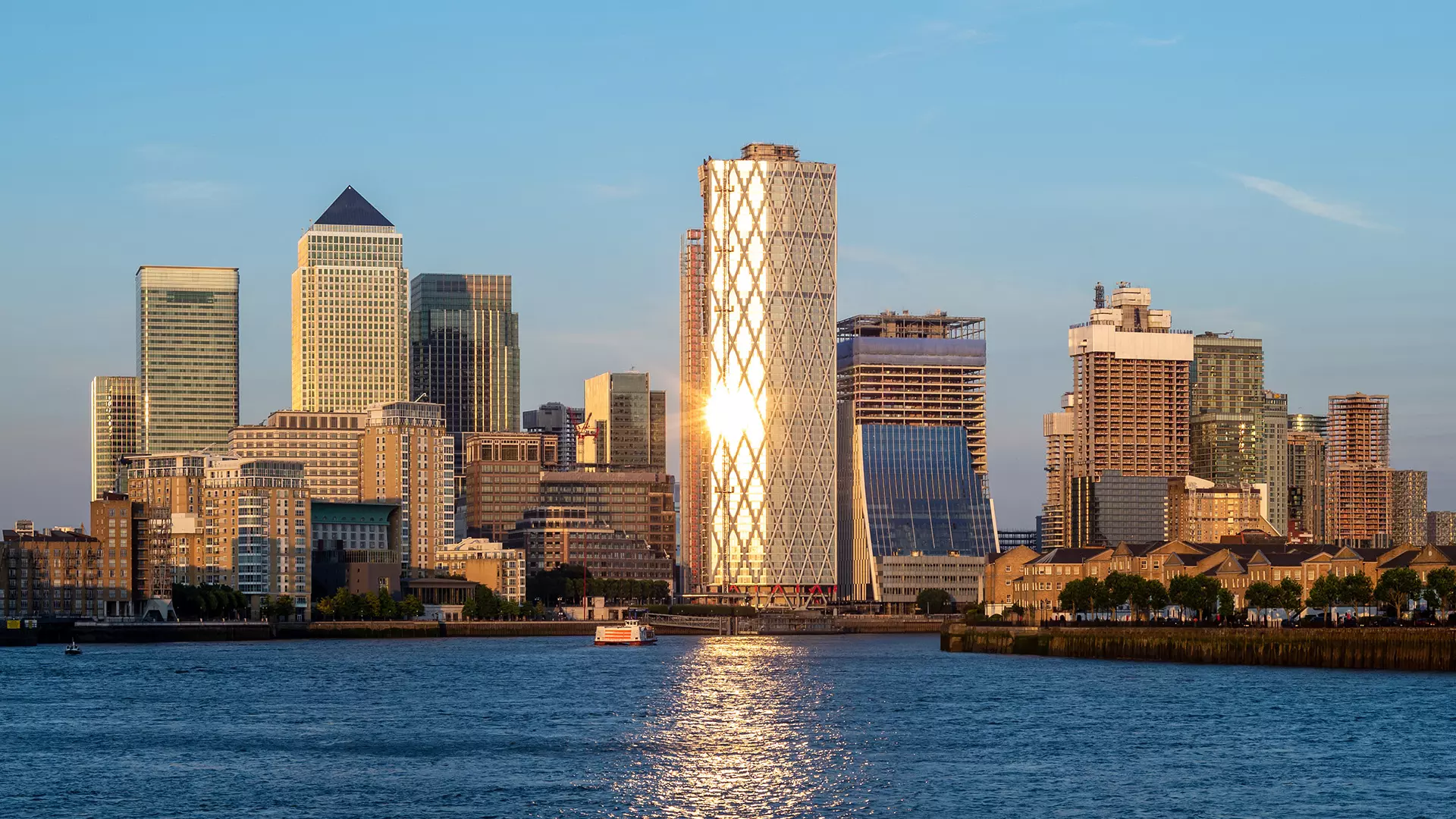 Credit: KPF Associates
Credit: KPF AssociatesCanary (Wharf) in the Coal Mine
What impact will the new UK budget have on levels of distress in commercial real estate?
March 22, 2024Real Estate
Written by Rory Hickman
Amidst rising financial distress in the UK and Chancellor Jeremy Hunt's recent budgetary initiatives, Canary Wharf emerges as a focal point for reinvention.
Facing challenges in construction and real estate, the district's targeted investments aim to spur innovation and residential growth. Yet, questions linger about the budget's efficacy in addressing broader housing and climate concerns.
As Canary Wharf evolves, it mirrors the dynamic interplay between economic resilience and urban renewal in a rapidly changing landscape.
Recent data reveals a concerning surge in company insolvencies, echoing levels not seen since the 2009 financial crisis. Particularly alarming is the 46% rise in critical distress levels among construction firms, underscoring the pervasive impact across the sector.
The construction and real estate industries collectively account for nearly 30% of all UK companies facing financial turmoil, attributed in part to factors like diminished home construction, dwindling infrastructure projects, and skyrocketing building material costs.
This distress isn't confined to the realm of businesses alone, with the commercial real estate debt market also witnessing a significant uptick in distress levels. Collateralized loan obligations (CLOs) comprising commercial mortgages have experienced a stark rise in distress rates, with multifamily and office building borrowers bearing the brunt of the turmoil.
Remote work trends have further compounded challenges in the office sector, as borrowers grapple with higher interest rates and the looming spectre of property devaluation upon refinancing.
Against this backdrop of financial turbulence, the recent UK budget announcement by Chancellor Jeremy Hunt has sparked both hope and critique, particularly in relation to Canary Wharf, a pivotal financial district in London.
In 2023, London's office market faced significant challenges, with plummeting investment in commercial real estate and struggling occupancy rates leading to talks of a "rental recession."
Once a bustling financial hub, Canary Wharf faces the challenge of reinventing itself in the wake of the pandemic and its impacts on office life and commercial real estate as a whole. With the shift away from commuting to the office 5 days a week, as well as the departure of corporate tenants and rising vacancies, the district is diversifying its offerings, focusing on residential spaces and leisure activities.
Although challenges are inevitable, investors remain optimistic, with an increased investment in housing projects and recreational amenities. The effort seems to be paying off, with increased foot traffic and a thriving hospitality scene.
While offices still hold significance, the district is evolving into a mixed-use area, attracting a variety of residents and businesses, ensuring resilience against market fluctuations. Efforts to modernise existing office spaces reflect a commitment to adapt to changing work patterns, emphasising comfort and amenities.
In July 2023, Canary Wharf Group and Kadans Science Partner received planning approval for Europe's largest and most technologically advanced life sciences building, located at the North Quay site in Canary Wharf, London. This 23-storey vertical campus, designed by Kohn Pedersen Fox Associates, aims to set a new benchmark in life sciences laboratories and workspaces, with completion expected in 2027.
The development prioritises sustainability, incorporating a low-carbon strategy and energy-efficient design. It complements Canary Wharf's existing life sciences community and benefits from exceptional connectivity, positioning it as a leading hub for health and life sciences innovation in a sustainable, mixed-use environment.
The life sciences industry is experiencing remarkable growth globally, with real estate playing a pivotal role in supporting its expansion. European investors, real estate giants, and governments are forming alliances, driving increased transaction volumes in the sector.
The United Kingdom has emerged as a leader in European life sciences, boasting significant investments and a strong focus on R&D. Participation in the Horizon Europe scheme further cements its position, offering lucrative funding opportunities for academic research institutions.
Tenant demands in the life sciences sector underscore the importance of flexible workspaces, location sensitivity, and amenities conducive to innovation. A significant share of the responsibility for meeting these evolving requirements falls on the shoulders of the real estate industry, demanding adaptability and new solutions.
SME housebuilders, often crucial in providing diverse and affordable housing options, require more substantial support to thrive and contribute effectively to addressing the housing shortage. Without adequate resources and incentives, their capacity to innovate and deliver sustainable housing solutions may be limited, exacerbating the crisis.
Moreover, retrofitting existing homes is a critical component of any comprehensive strategy to combat climate change. Improving energy efficiency in housing stock not only reduces carbon emissions but also enhances resilience to extreme weather events. The lack of comprehensive measures in the budget to incentivise and facilitate retrofitting represents a missed opportunity.
While the focus on community-led housing schemes is welcomed by some, others argue that it is insufficient to meet the nation's demand for sustainable housing. While community-led initiatives can foster a sense of ownership and promote localised solutions, they may not scale up quickly enough to address the magnitude of the housing crisis or the urgency of climate action.
Nevertheless, amidst these transformative developments, Canary Wharf is not immune to the broader shifts reverberating across London's financial landscape, with falling values putting pressure on landlords as loans mature.
One example of this is seen in the problems facing China Life Insurance Co. regarding their 10 Upper Bank Street office tower, as the loan deadline approaches amidst soaring vacancy rates. The property's value has plummeted due to increased vacancy rates, requiring upgrades to attract new tenants.
Pressure further mounts on landlords as tenants like HSBC Holdings Plc and Moody’s Corp. decide to vacate their Canary Wharf offices, exacerbating concerns about property valuations and exemplify a trend of prestigious tenants migrating towards the Square Mile, driven in part by changing preferences catalysed by the Covid-19 pandemic.
Similarly, the potential departure of the Financial Reporting Council from its traditional home in London's financial centre underscores the evolving regulatory landscape, indicative of broader transformations in the UK's financial ecosystem.
The upcoming GRI Distress Forum offers a timely platform for stakeholders to engage in critical discussions.
The "Reincarnation" session, in particular, promises insights into the transformative potential of distressed assets, shedding light on strategies for repurposing spaces and enhancing sustainability. With a focus on placemaking and adaptation, this session aligns seamlessly with Canary Wharf's quest to redefine its identity and functionality in response to shifting market dynamics.
As industry leaders convene to explore opportunities for value creation and innovation, the forum underscores the importance of collaboration and forward-thinking approaches in shaping the future of real estate. Find out more and register here.

Amidst rising financial distress in the UK and Chancellor Jeremy Hunt's recent budgetary initiatives, Canary Wharf emerges as a focal point for reinvention.
Facing challenges in construction and real estate, the district's targeted investments aim to spur innovation and residential growth. Yet, questions linger about the budget's efficacy in addressing broader housing and climate concerns.
As Canary Wharf evolves, it mirrors the dynamic interplay between economic resilience and urban renewal in a rapidly changing landscape.
Distressing Data?
In the wake of soaring financial distress among British businesses, the real estate sector finds itself at a critical juncture, grappling with challenges exacerbated by high interest rates and turmoil in construction and property industries.Recent data reveals a concerning surge in company insolvencies, echoing levels not seen since the 2009 financial crisis. Particularly alarming is the 46% rise in critical distress levels among construction firms, underscoring the pervasive impact across the sector.
The construction and real estate industries collectively account for nearly 30% of all UK companies facing financial turmoil, attributed in part to factors like diminished home construction, dwindling infrastructure projects, and skyrocketing building material costs.
This distress isn't confined to the realm of businesses alone, with the commercial real estate debt market also witnessing a significant uptick in distress levels. Collateralized loan obligations (CLOs) comprising commercial mortgages have experienced a stark rise in distress rates, with multifamily and office building borrowers bearing the brunt of the turmoil.
Remote work trends have further compounded challenges in the office sector, as borrowers grapple with higher interest rates and the looming spectre of property devaluation upon refinancing.
Reenvisioning the Region

(Credit: Richie Chan - AdobeStock)
Against this backdrop of financial turbulence, the recent UK budget announcement by Chancellor Jeremy Hunt has sparked both hope and critique, particularly in relation to Canary Wharf, a pivotal financial district in London.
In 2023, London's office market faced significant challenges, with plummeting investment in commercial real estate and struggling occupancy rates leading to talks of a "rental recession."
Once a bustling financial hub, Canary Wharf faces the challenge of reinventing itself in the wake of the pandemic and its impacts on office life and commercial real estate as a whole. With the shift away from commuting to the office 5 days a week, as well as the departure of corporate tenants and rising vacancies, the district is diversifying its offerings, focusing on residential spaces and leisure activities.
Although challenges are inevitable, investors remain optimistic, with an increased investment in housing projects and recreational amenities. The effort seems to be paying off, with increased foot traffic and a thriving hospitality scene.
While offices still hold significance, the district is evolving into a mixed-use area, attracting a variety of residents and businesses, ensuring resilience against market fluctuations. Efforts to modernise existing office spaces reflect a commitment to adapt to changing work patterns, emphasising comfort and amenities.
Budget Boost
The allocation of £118 million for a life science hub and 750 new homes in the budget signifies a concerted effort to revitalise the area and diversify its economic landscape. This investment, part of a larger pledge to build 8,000 homes in east London, aims to transform Canary Wharf into a vibrant hub for life science companies, leveraging its existing infrastructure and amenities.In July 2023, Canary Wharf Group and Kadans Science Partner received planning approval for Europe's largest and most technologically advanced life sciences building, located at the North Quay site in Canary Wharf, London. This 23-storey vertical campus, designed by Kohn Pedersen Fox Associates, aims to set a new benchmark in life sciences laboratories and workspaces, with completion expected in 2027.
The development prioritises sustainability, incorporating a low-carbon strategy and energy-efficient design. It complements Canary Wharf's existing life sciences community and benefits from exceptional connectivity, positioning it as a leading hub for health and life sciences innovation in a sustainable, mixed-use environment.
Life Science Lift-off

(Credit: KPF Associates)
The life sciences industry is experiencing remarkable growth globally, with real estate playing a pivotal role in supporting its expansion. European investors, real estate giants, and governments are forming alliances, driving increased transaction volumes in the sector.
The United Kingdom has emerged as a leader in European life sciences, boasting significant investments and a strong focus on R&D. Participation in the Horizon Europe scheme further cements its position, offering lucrative funding opportunities for academic research institutions.
Tenant demands in the life sciences sector underscore the importance of flexible workspaces, location sensitivity, and amenities conducive to innovation. A significant share of the responsibility for meeting these evolving requirements falls on the shoulders of the real estate industry, demanding adaptability and new solutions.
Concerns & Criticisms
The optimism surrounding targeted investments in housing is tempered by concerns regarding the broader housing crisis and climate imperatives. Critics assert that the current budget fails to sufficiently address these pressing issues. They argue that support for SME housebuilders is inadequate, and there is a notable absence of robust measures aimed at retrofitting existing homes to enhance energy efficiency.SME housebuilders, often crucial in providing diverse and affordable housing options, require more substantial support to thrive and contribute effectively to addressing the housing shortage. Without adequate resources and incentives, their capacity to innovate and deliver sustainable housing solutions may be limited, exacerbating the crisis.
Moreover, retrofitting existing homes is a critical component of any comprehensive strategy to combat climate change. Improving energy efficiency in housing stock not only reduces carbon emissions but also enhances resilience to extreme weather events. The lack of comprehensive measures in the budget to incentivise and facilitate retrofitting represents a missed opportunity.
While the focus on community-led housing schemes is welcomed by some, others argue that it is insufficient to meet the nation's demand for sustainable housing. While community-led initiatives can foster a sense of ownership and promote localised solutions, they may not scale up quickly enough to address the magnitude of the housing crisis or the urgency of climate action.
Distressed Departures

(Credit: Luciano Mortula-LGM - AdobeStock)
Nevertheless, amidst these transformative developments, Canary Wharf is not immune to the broader shifts reverberating across London's financial landscape, with falling values putting pressure on landlords as loans mature.
One example of this is seen in the problems facing China Life Insurance Co. regarding their 10 Upper Bank Street office tower, as the loan deadline approaches amidst soaring vacancy rates. The property's value has plummeted due to increased vacancy rates, requiring upgrades to attract new tenants.
Pressure further mounts on landlords as tenants like HSBC Holdings Plc and Moody’s Corp. decide to vacate their Canary Wharf offices, exacerbating concerns about property valuations and exemplify a trend of prestigious tenants migrating towards the Square Mile, driven in part by changing preferences catalysed by the Covid-19 pandemic.
Similarly, the potential departure of the Financial Reporting Council from its traditional home in London's financial centre underscores the evolving regulatory landscape, indicative of broader transformations in the UK's financial ecosystem.
What’s Next?
As Canary Wharf navigates these winds of change, characterised by both challenges and opportunities, its trajectory embodies the intricate interplay between economic resilience, urban revitalization, and the imperative for sustainable growth in an ever-evolving global landscape.The upcoming GRI Distress Forum offers a timely platform for stakeholders to engage in critical discussions.
The "Reincarnation" session, in particular, promises insights into the transformative potential of distressed assets, shedding light on strategies for repurposing spaces and enhancing sustainability. With a focus on placemaking and adaptation, this session aligns seamlessly with Canary Wharf's quest to redefine its identity and functionality in response to shifting market dynamics.
As industry leaders convene to explore opportunities for value creation and innovation, the forum underscores the importance of collaboration and forward-thinking approaches in shaping the future of real estate. Find out more and register here.




